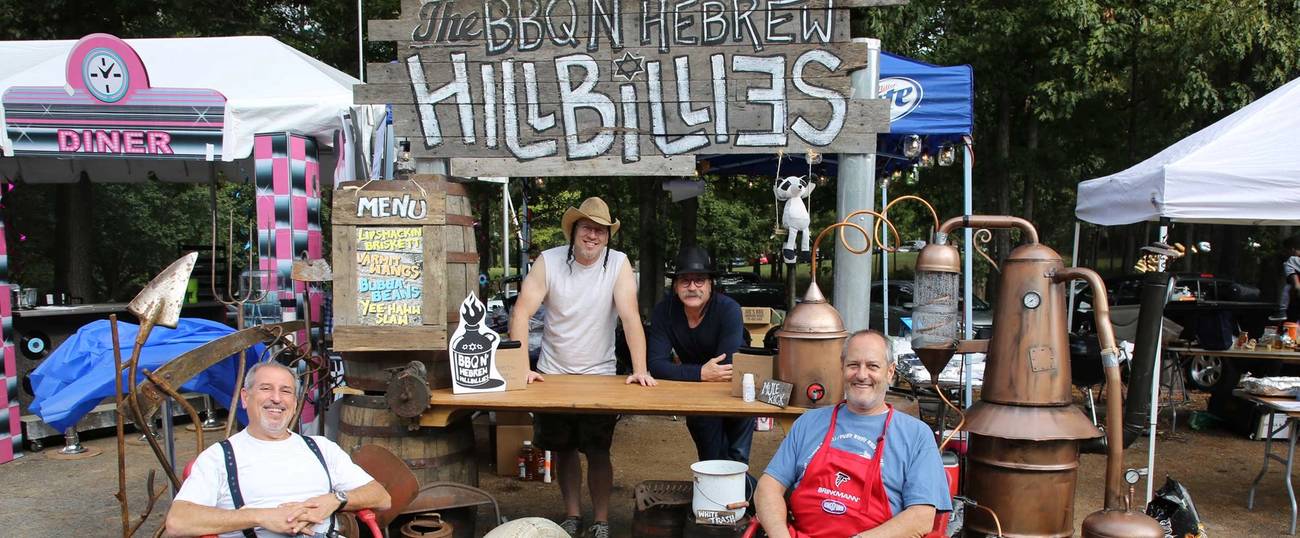Atlanta Emerges as the Jewish-Foodie Capital of the South
Kosher BBQ, sweet potato cheesecake, and fried chicken Shabbat dinner: The city’s restaurants and food festivals blend religious tradition with Southern innovation




When Liz Mennen, a Manhattan transplant, arrived in Atlanta at age 22, she searched everywhere for a staple of her youth: the knish. But the dough-encrusted, potato-filled Jewish pastry was nowhere to be found, except in the frozen-food aisle of Kroger supermarkets. In April of this year—seven years after she arrived in Atlanta— she decided she’d had enough of a knish-less existence, and she served her first knish through her newly incorporated business, Oy Veg Kitchen.
Mennen’s knishes epitomize the Jewish-food scene in Atlanta—steeped in tradition but constantly innovating. She makes two varieties: the Old School, which usually features caramelized onions and potatoes (sometimes she replaces the potatoes with seasonal veggies like kohlrabi), and the Sweet and Sassy, a Southern-inspired sweet-potato-filled version stuffed with a layer of ricotta cheese and seasoned with cayenne pepper.
“I didn’t intend for them to taste like a knish from 1930s Poland or a knish in New York,” said Mennen, “because I start with ingredients from the farmers market.”
Mennen was scheduled to serve up her knishes at Atlanta’s first Sukkot Farm-to-Table Festival on Oct. 8, one of the events that has marked the emergence of Atlanta as the Jewish foodie capital of the South. (Illness caused her to miss the event.)
The festival is the brainchild of community organizer and entrepreneur Jonathan Tescher. Last year he organized a Sukkot farm-to-table dinner that drew around 90 people, but this year, to expand the dinner into a festival, he gathered everyone from Jewish vegetable farmers to purveyors of vegan kosher gelato and a local farm-to-table dog-biscuit company that sells dreidel-shaped treats. A Sukkot-themed dessert cook-off, chef demos, and food workshops rounded out the event, which drew about 200 people to the Marcus Jewish Community Center.
Tescher used to organize a farm-to-table Chinese dinner on Christmas Eve, but now that he’s moved on to Sukkot, his mantle for the Christmas event has been taken up by Todd Ginsberg, chef at Atlanta’s neo-Jewish deli, The General Muir. On Christmas Eve Eve (Dec. 23), the deli is transformed into a Chinese restaurant, complete with Chinese horoscope placemats and teapots. Special menus are crafted by co-owner Shelley Sweet; Ginsberg whips up American-Chinese classics including General Tso’s chicken, beef and broccoli, and wonton soup, which “basically was just matzo-ball soup and kreplach combined,” he said. Held at the deli since 2016, these dinners have become so popular that they’re adding an extra night this year—Dec. 22, Christmas Eve Eve Eve.
The General Muir was born four years ago, in part out of frustration. In 2012, Jennifer Johnson, her husband Ben, and their friend Sweet were working at their restaurant West Egg and musing on the dearth of good Jewish delis in the city; meanwhile, in another part of Atlanta, Ginsberg was thinking the same thing. They joined forces and created The General Muir in 2013. (Its name is an hommage to the refugee-transport ship the General C.H. Muir that ferried Jennifer Johnson’s Holocaust-surviving mother and grandparents from their home in a displaced-persons camp in Deggendorf, Germany, to the United States in 1949.)
The General Muir’s owners have since built a mini-Jewish food empire in Atlanta. There’s a bakery (TGM Bread), a catering company, and a bagel shop (TGM Bagels), which opened this June in their new micro-food hall, The Canteen, located near Georgia Tech’s campus. Combining Ashkenazi and Sephardic-style Jewish food under one roof, The Canteen also features an outpost of their Middle Eastern restaurant, Yalla; their (non-Jewish, bacon-serving) sandwich concept, Fred’s Meat and Bread; and a bar. On a recent Sunday, people of all ages could be seen at the food hall, noshing on pumpernickel bagels, chicken shwarma, and babka.
Although The General Muir and its sister restaurants are steeped in Jewish history, they also incorporate Southern traditions and a farm-to-table ethos. James Beard Award-nominated chef Ginsberg dishes out creative Jewish fare, like a pastrami-topped poutine, while the bakery has been experimenting with Southern twists on Jewish favorites, like sweet-potato New York cheesecake. Ginsberg explains that The General Muir is not a replica of a classic deli, but a tribute. Yet the restaurant didn’t abandon tradition altogether. There were a few classics that the owners felt no Jewish deli could be without, including matzo-ball soup, house-cured pastrami and corned beef, chopped liver, and rye bread.
Perhaps the most emblematic Southern-Jewish dish The General Muir serves is its fried chicken, which is available only on Fridays. It emerges from the kitchen glistening and tucked into a blue-and-white blanket. The skin is perfectly crispy, caramel colored with a satisfying crunch that reveals tender poultry underneath. Although Shabbat fried chicken may seem like a new concept, it is, in fact, traditional—at least in Atlanta. German Jews in the city have been eating fried chicken since the late 19th century, in part to fit into Southern culture, according to historian Marcie Cohen Ferris.
The General Muir team wants to be a part of the larger Atlanta community. “We have as many non-Jews as we do Jews in our restaurant at any time of day,” Ginsberg said. Yet Jewishness is woven into the deli’s DNA. It hosts Passover Seders, and Rosh Hashanah dinners, and post-Yom Kippur break-fasts that are packed with non-Jews who’ve come with their Jewish friends to learn about the holidays. “People kill each other over religion, unfortunately,” said Jennifer Johnson. “So when you make it into something that’s so easy because it’s about food and breaking bread, [it] is really very satisfying.”
“We’ve sort of joked that deli is the secular synagogue,” Ben Johnson added.
Although The General Muir isn’t kosher or even kosher-style, one ingredient is left off the menu: pork. “There were certain lines in the sand that we wanted to draw,” Ginsberg said.
Exactly where to draw these lines varies from business to business. Goldberg’s Bagel Co. & Deli, an Atlanta institution with nine outposts around the city, was started in 1972 by the Goldberg family, before being bought by two South African Jews, Howard Aaron and Wayne Saxe, in 1994. Its most famous offering is its po’boy; rather than filling it with seafood, the way the Southern sandwich is typically made, Goldberg’s fills it with scraps of deli meat and cheese. “We have to please our customers,” most of whom aren’t Jewish, Chief Operating Officer Stan Fur explained.
Meanwhile, the 4-month-old Tip Top Kosher market recently opened a restaurant—serving Israeli and Jewish cuisine—behind its gefilte-fish-filled dairy case. Israeli chef David Golan offers four styles of hummus, Jerusalem salad, and chicken liver and onions. Unlike Goldberg’s and The General Muir, this place is strictly kosher.
Not all the kosher food in Atlanta is traditional, nor is it all made by Jews. One of the biggest kosher catering companies is headed by a Lutheran chef named Jodie Sturgeon. At For All Occasions & More, Sturgeon dishes out tweaks on Jewish classics. A signature dish is her noodle kugel: made not from thick egg noodles, but thin angel hair pasta, which is then topped with Frosted Flakes. Another hit is her Southern pecan fried chicken with a peach-schnapps glaze. “In Atlanta, they’re looking for kosher food that’s … traditional with a twist,” Sturgeon said.
How did a Lutheran become one of Atlanta’s premiere kosher caterers? She got bored with her job cooking at the Ritz-Carlton and took a job at a kosher bagel store. She loved making kosher food, so when the store shuttered its doors, she started her own company.
Sturgeon is so heavily involved in the kosher-food world that she even participates in the Atlanta Kosher BBQ Festival and competition, which is now in its fifth year. She’s one of many non-Jews who enter the competition, including the members of the Dekalb Fire Department. Like many of the other successful Jewish-food enterprises in Atlanta, the festival is as much about community as it is about the food. And there’s nothing more Southern than that.
This year’s festival, held Oct. 22, drew 5,500 people, many of them non-Jewish. “Nowhere else in the state of Georgia,” said this year’s festival director, Jody Pollack, “will you get a mix of ethnicities sitting at the same table eating the same food and kibitzing.”
***
Like this article? Sign up for our Daily Digest to get Tablet Magazine’s new content in your inbox each morning.
Hallie Lieberman is a writer and historian who is the author of the forthcoming Buzz: A Stimulating History of the Sex Toy.